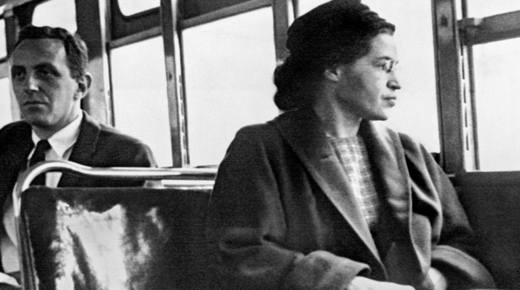
On December 1, 1955, Rosa Parks, 42 years old, was arrested in Montgomery, Ala., for refusing to give up her seat on a public bus. The “white” section of the segregated bus was filled, and a white passenger was legally entitled to sit down and make a Black rider stand.
This was not a spontaneous act of defiance. Rosa Parks may have been weary, but she risked physical abuse, arrest and jail not because she had worked a full day and was tired, but because she was part of a growing movement of African Americans sick and tired of discrimination and racism. This act of civil disobedience was the culmination of years of community and organizational activity and Parks had been an active participant for many years.
In 1955, Parks, 42, was convicted of disorderly conduct for refusing to give up her seat to a white man. She was fined $14. Right after her arrest, the Montgomery Improvement Association was founded. This primarily church-based group elected a very young representative to spearhead the boycott of the municipal bus company. His name was Martin Luther King Jr.
In total solidarity for a year and a month, the Black citizens of Montgomery supported the King-led movement as they walked, carpooled, biked and found whatever means necessary to attend to their daily lives of work, school, church, community and social activities.
This united effort deprived the business community and the transportation system of tens of thousands of dollars that Black citizens contributed to the economy of Montgomery. After going through lower levels of the court system, the Supreme Court on Nov. 13, 1956, ruled that segregated buses were unconstitutional.
Rosa Parks was not the first to resist segregation on buses, but hers was the case that eventually came to symbolize this phase of the civil rights struggle. The ensuing Montgomery Bus Boycott, led by president of the local NAACP, Edgar Nixon; and by the Rev. Martin Luther King, Jr., lasted more than a year, and was a unifying force for the city’s Black community. News of it spread globally, and galvanized the conscience of America. Eventually the U.S. Supreme Court declared the segregation law unconstitutional.
Often portrayed as a humble, ordinary working woman who was simply “tired of giving in,” Parks was already politically advanced. She served as secretary of the Montgomery chapter of the NAACP, and had prepared for her dramatic but nonviolent action defending workers’ rights and racial equality at the Highlander Folk School, a training center in Tennessee.
In later years, from 1965 to 1988, living in Detroit, Parks worked for long-serving John Conyers, an African-American U.S. Representative.
Upon her death in 2005, she was the first woman and second non-U.S. government official to lie in honor at the Capitol Rotunda. She is permanently honored by a statue in the United States Capitol’s National Statuary Hall, and is featured on a U.S. postage stamp.
Hypocrites who capitalize on Parks’ legacy find it easy to pay tribute to a heroine of peaceful protest as they ignore the plight of the tens of thousands of poor people, primarily poor Black and people of color. They praise Parks’ compassion and dedication to the dispossessed, while out of the other side of their mouths they propose legislation to weaken and destroy Social Security, Medicare, Medicaid, public education and child services. Celebrating Rosa Parks’ legacy by confronting injustice and fighting for genuine human rights must become a national priority. The ultimate tribute to the “mother of the civil rights movement” is a united national movement to struggle for a true and just society for all races and all working people of our country and of the world.
Debbie A. Bell and Wikipedia contributed to this article.
Photo: “Rosaparks bus” by http://www.loc.gov/rr/print/list/083_afr.html#ParksR. Via Wikipedia.

MOST POPULAR TODAY

High Court essentially bans demonstrations, freedom of assembly in Deep South

U.S. imperialism’s ‘ironclad’ support for Israel increases fascist danger at home

UN warns that Israel is still blocking humanitarian aid to Gaza

Resource wars rage in eastern Congo, but U.S. capitalism only sees investment opportunity







Comments